
Christians has been looking forward to the Second Coming of Christ for years. Yet, as Christians wait unwearyingly, the world is growing increasingly cynical. Are the signs really showing that Christ is returning soon? Recently, Steve Cioccolanti shared at the New Life Community Church (NLCC) about this subject matter and he believes that recent developments in history do indeed show that Christ’s return is imminent.

Steve shared that as people of God, we have been given the dispensation to understand and sense the times. Many Christians think that the coming of the Lord will be as a thief in the night (1 Thessalonians 5:2-3). However, this passage also goes on to say in verse 4 that the people of God will not be in the dark about these things and that the Lord’s coming will not be a surprise to us. What signs have God given to us? In order to understand these things, he communicated, we have to understand our Hebrew roots.
Rosh Hashanah
One of the primary remembrances for the Hebrew people is what is known as the Rosh Hashanah, which is the Jewish New Year. The Encyclopaedia Judaica states the following information about this holy day. The Biblical name for this holiday is Yom Teruah (Hebrew: יוֹם תְּרוּעָה, literally “day [of] shouting/raising a noise”) or the Feast of Trumpets. It is the first of the High Holy Days or יָמִים נוֹרָאִים Yamim Nora’im (“Days of Awe”) which usually occur in the early autumn of the Northern Hemisphere. During this celebration, the shofar/trumpet would be blown.

Rosh Hashanah is a two-day celebration, which begins on the first day of Tishrei. The day is believed to be the anniversary of the creation of Adam and Eve, the first man and woman, and their first actions toward the realization of humanity’s role in God’s world. Tishrei is the first month of the Jewish civil year, but the seventh month of the ecclesiastical year. In Jewish liturgy, Rosh Hashanah leads to Yom Kippur, which is described as “the day of judgment” (Yom ha-Din) and “the day of remembrance” (Yom ha-Zikkaron).
All these would play a part in the reading of the signs of the times as communicated by Steve. He communicated that there are 7 feasts in the Bible (a number which is believed to be significant to God) but only one that did not have a definite date. Before each year’s Feast of Trumpets, the Rabbi had to sight the New Moon. Steve shared that Jesus was telling His Jewish audience to watch out for this ‘Unknown Day’ which is a Hebrew idiom for Rosh Hashanah or the Feast of Trumpets.

The phenomenon of the Blood Moon prophecies is also somewhat related to this, and according to the prophecies, the last of the Blood Moons in the tetrad (2014-2015) will occur at the start of the Feast of Tabernacles, near the time of the Jewish New Year, with the other 3 also taking place near a significant Jewish holiday. A solar eclipse in 2015 would occur on Rosh Hashanah itself. Steve shared that in 1 Corinthians 15:51-52 Paul confirms that the Rapture would occur sometime during a 2-day period of a Feast of Trumpets, when the Last Trumpet is blown.
God Keeps a Calendar
God keeps a calendar, Steve said, and He is always faithful to His appointments. He remembers every anniversary, and within His calendar are cycles and appointed times. The Old Testament Hebrews followed the Mishnah which was the first written record of the ‘Oral Torah’. The second Order of the Mishnah was the moed which covered the festivals of the Jewish people.

After Christ’s first coming during the time of the New Testament, God brought into passing many kairos (opportune) moments within the moeds. Steve communicated that one of the most significant kairos moment within God’s calendar was in the year 1947. 1947 was the year of the UN Resolution 181, the founding of the Dead Sea Scrolls, and the Roswell Incident.

Steve shared that while the stir surrounding the Roswell Incident was not of God and the Church, 1947 was a year of heightened spiritual activity among Jews, Christians, and Gentiles (the world). In 2017, we will be approaching the 70th anniversary from 1947; also a Jubilee year and 50th anniversary of a significant moment in Jerusalem’s history.
9 Holidays God Intended
There are 9 holidays that are significant in the Jewish calendar, and Steve shared that there have been events in them that corresponded in a way that must be more than chances. The Passover in Egypt and the Crucifixion in which the Lamb of God was slain occurred around the 14 of Nisan. The flight from Egypt and the Burial of Jesus both occurred near the 15 of Nisan. God parted the Red Sea near the 17 of Nisan and Christ’s Resurrection rescued us from eternal death near the same date.

The first Passover was for the Jews, but just as implied in 1 Corinthians 10:32, the true Passover through Christ was for Jews, Christians, and every nation of this world. Where did the Chinese get the tradition of painting red over their door mantels during Chinese New Year? Where did the Japanese get their tradition of passing under a red torii meant passing into the sacred?

Other examples of such dates are the giving of the Law during the 6 of Sivan and the first Pentecost recorded in Acts occurring around the same time. Steve shared that according to God’s calendar and the significance of the tally of events in it, he believes that the Rapture would occur around the time of the Yom Teruah or Feast of Trumpets in Tishri which corresponds to the month of September in the Gregorian calendar.
History Repeats Itself
History repeats itself in God’s calendar, Steve said. History is prophecy and the most significant events all happen on the same days. The 1 of Tishrei on which the Rosh Hashanah or Feast of Trumpets begin every Jewish year is a very special day. Among other events, it was the Day of Creation and also the day Ezra read the Torah to the people and caused them to understand it.

God’s festivals are always significant, Steve shared. What is more, they are all predictive and they all point to the Messiah and the Hebrew name of Jesus. There is a correlation between the Old Testament and New Testament. God gives us signs so that we are prepared, he conveyed.
|Share The Good News|
– Jason Law
NOTE: The aim of the writer is to present the impartation in an impartial manner. While the arguments presented by the speaker is intriguing, the writer also believes that readers should practice their own judgments in contentious topics such as these.




Leave a Reply